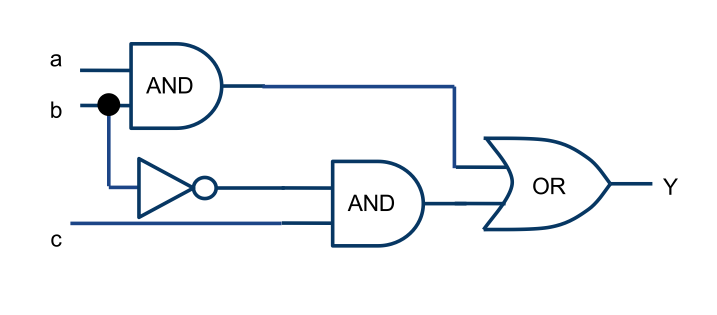Difference between revisions of "CSC103 Homework 2 2012"
(Created page with "--~~~~ ---- <center> <font size="+2">Page under construction!</font> <br \>300px </center> <bluebox> This homework is due in class, on 2/15/12. ...") |
m (moved CSC103 Homework to CSC103 Homework 2 2012) |
||
| (3 intermediate revisions by the same user not shown) | |||
| Line 3: | Line 3: | ||
| − | <center> | + | <!--center> |
<font size="+2">Page under construction!</font> | <font size="+2">Page under construction!</font> | ||
<br \>[[File:UnderConstruction.jpg|300px]] | <br \>[[File:UnderConstruction.jpg|300px]] | ||
| − | </center> | + | </center--> |
<bluebox> | <bluebox> | ||
| Line 19: | Line 19: | ||
| + | <br /> | ||
| + | What is the truth table of this circuit? You can figure out the answer in several ways. One is to analyze the circuit "by hand" on a piece of paper and figure out the value of the different signals at the output of the different gates for all possible combinations of the inputs. The other one, longer but fool-proof, is to use the [http://maven.smith.edu/~thiebaut/classes/103/applets.htm logic simulator] we used in class, "wire-up" the circuit, and test its output for all combinations of the inputs. | ||
<br /> | <br /> | ||
<br /> | <br /> | ||
| + | =Word Problem to Schematics= | ||
| + | Here is a word problem. Design a circuit with boolean gates that has 3 inputs and 1 output. The inputs are called ''window1'' (or ''w1'' if you prefer a shorter name), ''window2'' (or ''w2''), and ''rain'' (or ''r''). The output is called ''alarm'' (or ''a''). The circuit should set ''alarm'' to 1 whenever the signal ''r'' is 1 (it's raining), and either ''window1'' or ''window2'' are 1 (i.e. one of them is open). | ||
| + | <br /> | ||
| + | Go through the process we went through in class on Wednesday, starting with the word problem, then creating the truth table, and from that generating the boolean equation for ''alarm'', and finally designing the circuit. | ||
<br /> | <br /> | ||
| − | + | Wire up the circuit in the [http://maven.smith.edu/~thiebaut/classes/103/applets.htm logic simulator]. Verify that ''alarm'' is 1 only when it rains and one of the windows (or both) is open. | |
<br /> | <br /> | ||
| − | + | Take a screen capture of your logic circuit in the simulator and include it with the work you turn in. | |
<br /> | <br /> | ||
| + | Your answer to this problem should be: | ||
| + | * the truth table for alarm | ||
| + | * the boolean equation | ||
| + | * the logic diagram, captured on the screen. | ||
<br /> | <br /> | ||
Latest revision as of 09:47, 9 February 2012
--D. Thiebaut 08:58, 9 February 2012 (EST)
This homework is due in class, on 2/15/12. You can work on it in pairs, in which case you should put both names on the work you turn in. If you work in pairs, you must do the work together, i.e. meet one or several time to accomplish all the work with your partner.
Logic Design Problem
What is the truth table of this circuit? You can figure out the answer in several ways. One is to analyze the circuit "by hand" on a piece of paper and figure out the value of the different signals at the output of the different gates for all possible combinations of the inputs. The other one, longer but fool-proof, is to use the logic simulator we used in class, "wire-up" the circuit, and test its output for all combinations of the inputs.
Word Problem to Schematics
Here is a word problem. Design a circuit with boolean gates that has 3 inputs and 1 output. The inputs are called window1 (or w1 if you prefer a shorter name), window2 (or w2), and rain (or r). The output is called alarm (or a). The circuit should set alarm to 1 whenever the signal r is 1 (it's raining), and either window1 or window2 are 1 (i.e. one of them is open).
Go through the process we went through in class on Wednesday, starting with the word problem, then creating the truth table, and from that generating the boolean equation for alarm, and finally designing the circuit.
Wire up the circuit in the logic simulator. Verify that alarm is 1 only when it rains and one of the windows (or both) is open.
Take a screen capture of your logic circuit in the simulator and include it with the work you turn in.
Your answer to this problem should be:
- the truth table for alarm
- the boolean equation
- the logic diagram, captured on the screen.
